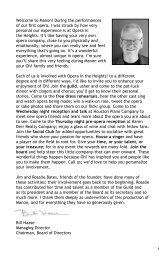A Message from the Managing Director - Kelly Blakley Graphic Media
A Message from the Managing Director - Kelly Blakley Graphic Media
A Message from the Managing Director - Kelly Blakley Graphic Media
You also want an ePaper? Increase the reach of your titles
YUMPU automatically turns print PDFs into web optimized ePapers that Google loves.
10<br />
Verdi closes his first act with <strong>the</strong> entire chorus<br />
and all principals on stage after <strong>the</strong> slaying of<br />
Duncan.<br />
He slays Banquo in his Act II by conspirators<br />
and closes it by combining Shakespeare’s<br />
Act III, scene 4 into his finales for “<strong>the</strong> banquet<br />
scene”. The banquet is simultaneously<br />
<strong>the</strong> high point of Macbeth’s reign and <strong>the</strong><br />
beginning of his downfall. Macbeth’s bizarre<br />
behavior puzzles and disturbs his subjects,<br />
confirming <strong>the</strong>ir impression that he is mentally<br />
troubled. Lady Macbeth here appears surefooted<br />
and stronger than her husband, but<br />
even her attempts to explain away her husband’s<br />
“hallucination” are ineffective when<br />
paired with <strong>the</strong> evidence of his behavior.<br />
Verdi, of course, in writing opera, introduces<br />
operatic techniques and numbers such as <strong>the</strong><br />
“Brindisi” of Lady Macbeth to interrupt <strong>the</strong><br />
action, and <strong>the</strong> great chorus, “Patria<br />
opressa”. It is unclear whe<strong>the</strong>r Banquo’s<br />
ghost really sits in Macbeth’s chair or whe<strong>the</strong>r<br />
<strong>the</strong> spirit’s presence is only a hallucination<br />
inspired by guilt. Macbeth is thick with supernatural<br />
events and characters, so <strong>the</strong>re is no<br />
reason to discount <strong>the</strong> possibility that a ghost<br />
actually stalks <strong>the</strong> halls. Some of <strong>the</strong> apparitions<br />
that appear in <strong>the</strong> play, such as <strong>the</strong><br />
floating dagger in Act II, scene 1, and <strong>the</strong><br />
unwashable blood that Lady Macbeth perceives<br />
on her hands in Act IV, appear to be<br />
more psychological than supernatural in origin,<br />
but even this is uncertain.<br />
These recurring apparitions or hallucinations<br />
reflect <strong>the</strong> sense of metaphysical dread that<br />
consumes <strong>the</strong> royal couple as <strong>the</strong>y feel <strong>the</strong><br />
fateful force of <strong>the</strong>ir deeds coming back to<br />
haunt <strong>the</strong>m. Given <strong>the</strong> role that Banquo’s<br />
character plays in Macbeth, it is appropriate<br />
that he and not Duncan should haunt Macbeth.<br />
Like Macbeth, Banquo heard <strong>the</strong><br />
witches’ prophecies and entertained ambitions.<br />
Never<strong>the</strong>less, unlike Macbeth, Banquo<br />
took no criminal action. His actions stand as a<br />
rebuke to Macbeth’s behavior and represent<br />
a path not taken, one in which ambition need<br />
not beget bloodshed.<br />
In Holinshed’s Chronicles, <strong>the</strong> history that<br />
served as <strong>the</strong> source for Shakespeare’s Macbeth,<br />
Banquo was Macbeth’s accomplice in<br />
Duncan’s murder. Shakespeare most likely<br />
changed Banquo’s role <strong>from</strong> villain to moral<br />
pillar because Shakespeare’s patron, King<br />
James I of England, was believed to be Banquo’s<br />
descendent.<br />
Verdi extracts <strong>the</strong> famous “sleepwalking<br />
scene” <strong>from</strong> Shakespeare’s Act V, scene 1.<br />
Macbeth ceased to be a sympa<strong>the</strong>tic hero<br />
once he made <strong>the</strong> decision to kill Duncan, but<br />
by <strong>the</strong> end of <strong>the</strong> play he has become so<br />
morally repulsive that his death comes as a<br />
powerful relief. Ambition and bloodlust must<br />
be checked by virtue for order and form to be<br />
restored to <strong>the</strong> “sound and fury” of human<br />
existence. Only with Malcolm’s victory and<br />
assumption of <strong>the</strong> crown can Scotland, and<br />
<strong>the</strong> play itself, be saved <strong>from</strong> <strong>the</strong> chaos engendered<br />
by Macbeth.<br />
Verdi dedicated this opera written in 1847 to<br />
his beloved fa<strong>the</strong>r-in-law, Antonio Barezzi. He<br />
called Macbeth one of <strong>the</strong> greatest creations<br />
of man. He revised it for 1865 performances<br />
in Paris. It is odd to note that <strong>the</strong> first performances<br />
in Florence were ra<strong>the</strong>r successful, but<br />
<strong>the</strong> revised versions for Paris were not. It had<br />
to wait until well into <strong>the</strong> twentieth century to<br />
take its rightful place in <strong>the</strong> repertoire.<br />
JACQUELINE HAMILTON<br />
International Art Consultant<br />
International Association of Professional Art Advisors<br />
P.O. Box 1483 Jacqueline Hamilton ad Tel: 713-974-3011<br />
Houston, TX 77251-1483 Fax: 713-974-3009<br />
Email: jhamiltonart@sprintmail.com<br />
www.jacquelinehamilton.com<br />
ARTIST BIOGRAPHIES<br />
On Stage<br />
COURTNEY AMES*<br />
Lady Macbeth<br />
Cherry Hill, NJ<br />
Hansel and Gretel, Nevada Opera<br />
Halka, Sarasota Opera<br />
The Magic Flute, Des Moines Metro<br />
Opera<br />
NICOLA BECHT*<br />
Lady Macbeth<br />
Bayreuth, Germany<br />
Don Giovanni, New European<br />
Festival, Stuttgart<br />
Die Fledermaus, Opera Fürth<br />
Wiener Blut, Sommeroperette<br />
Coburg & Junges Theater/Austria<br />
BRIAN B. CARTER<br />
Macbeth<br />
Palo Alto, CA<br />
Rigoletto, Rigoletto, Sept. 2006<br />
Rigoletto, Sarasota Opera<br />
Turandot, Opera North<br />
Gianni Schicchi, Opera Illinois<br />
DAVID EKSTROM<br />
Macduff<br />
Texarkana, TX<br />
Pollione, Norma, Jan 2006<br />
Fidelio, Empire Opera<br />
I Puritani, Bel Canto at Caramoor<br />
JACQUELINE HAMILTON<br />
CHAD International KARL* Art Consultant HANS<br />
International Macbeth Association of Professional Art Advisors STOCKENBERGER<br />
P.O. Box 1483<br />
Mayville, NY<br />
Manservant Tel: 713-974-3011<br />
Houston, TX 77251-1483<br />
Houston, TX<br />
Madama Butterfly, I Pagliacci,<br />
Fax: 713-974-3009<br />
Opera Email: Company jhamiltonart@sprintmail.com<br />
of <strong>the</strong><br />
Highlands<br />
www.jacquelinehamilton.com<br />
La Bohème, Jacksonville Lyric<br />
Opera, Grandview Opera<br />
BENJAMIN LECLAIR<br />
Banquo<br />
Royal, IA<br />
Oroveso, Norma, Jan 2006<br />
Figaro, Marriage of Figaro, 2007<br />
Cosi fan tutte, Albert Herring,<br />
Merola Opera Program<br />
Boris Godunov, Northwestern Univ.<br />
MATT MASCHEK<br />
Murderer<br />
Houston, TX<br />
Oh! Chorus: Don Pasquale,<br />
Madama Butterfly<br />
National Assn. of Teachers of Singing<br />
competition finalist, Houston<br />
chapter, 2008.<br />
RITA MINTER<br />
Lady in Attendance<br />
College Station, TX<br />
Oh! Chorus: Don Pasquale,<br />
Madama Butterfly, Tosca, Adriana<br />
Lecouvreur, etc.<br />
Rita is preparing a new concert<br />
program & honing her skills.<br />
KEIR MURRAY<br />
Physician<br />
Houston, Texas<br />
Yamadori, Commisario,<br />
Madama Butterfly, 2008<br />
Angelotti, Tosca, 2008<br />
Quinault, Adriana Lecouvreur,<br />
2008<br />
Oh! Chorus: Madama Butterfly,<br />
Don Pasquale.<br />
Hans has been active in music<br />
since childhood: singing,<br />
playing & composing.<br />
7




